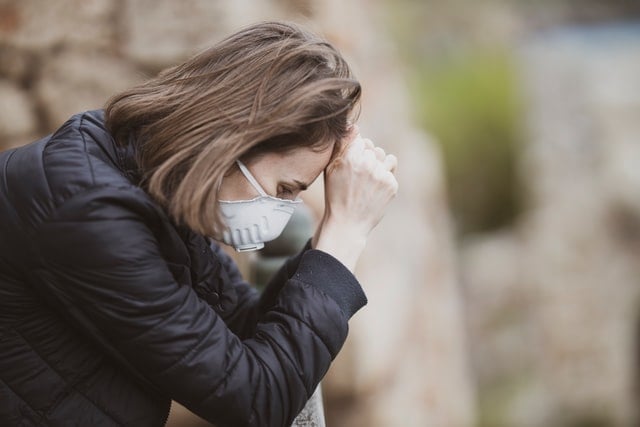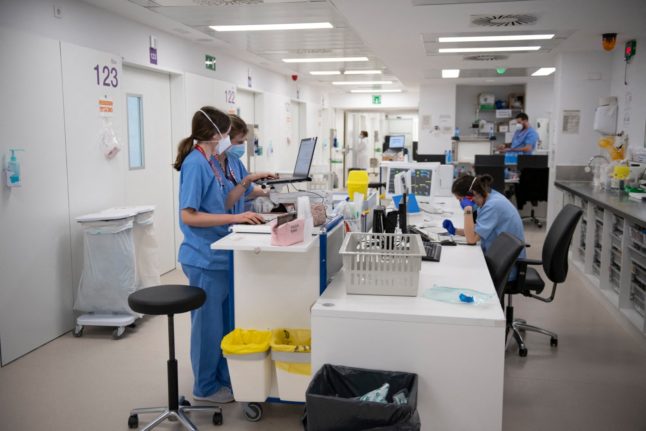Here’s the updated guide for those in Spain based on the official advice from Spain’s Health Ministry.
Do you have symptoms?
Spain’s Health Ministry warn that if you have either a fever or a cough then you must seek medical advice as these are the two most common symptoms of the coronavirus.
Other symptoms to look out for are; diminished sense of taste and smell, chills, sore throat, muscle aches, general weakness, diarrhea or vomiting.
The first thing to do if you feel you have symptoms is to stay at home, isolate yourself from others within the home, and call a dedicated phone line to medical services which is different in each region.
Find or a full list of all the numbers for each region HERE or in the picture below.

Once you have made the call you will be put in touch with a medical supervisor who will tell you the next step such as where to get a test and what to do.
It can take a while to get through on the dedicated lines but keep trying and don’t leave the house until you do.
You can also try and phone your own primary care provider at your Centro de Salud.
However, if you experience a sudden worsening of symptoms and suffer shortness of breath or chest pains then immediately phone the emergency number of 112.
What next if you have symptoms?
The moment you suspect you may have coronavirus then you have to take immediate steps.
You are expected to self-isolate at home which according to Spain’s Ministry of Health guidelines means “stay in a room by yourself, with a window, keeping the door closed and, if possible, with a bathroom to yourself. If this is not possible: Maintain a safety distance of 2 m from other people, and follow good hygiene measures”.
These are the general guidelines:
Isolation:
- Isolate a suspected coronavirus patient in their own room with exclusive access to a bathroom If that is not possible then maintain at least two metres from the patient at all times
- The room should be well-ventilated with an open window to the outside, but avoid air currents to the rest of the house.
- Keep the door shut on them to avoid contagion with those living in the rest of the house.
- Make a flip top bin available for them (lined with a bag) so they can dispose of their own waste tissues.
Communication:
- Make sure they have a phone line to communicate directly with medical staff in case the symptoms worsen.
- To minimise contact with the rest of the household, use a monitor (such as in use for young children) or communicate by mobile phone.
Confinement
- If possible limit the patient’s movement in the rest of the house to avoid contagion with others living there.
- If that isn’t possible then make sure they use a face mask and wash their hands frequently
- Pay special attention to clean everything handled by the patient and disinfect it after they have touched it
- Avoid other people coming to the house
Keep clean
- Wash hands properly after every interaction with the patient.
- Everyone in the household should wash hands after coughing, sneezing, using a tissue, and before eating and after wiping down surfaces.
- Keep a set of utensils, cup, glass, plates etc, only for use by the contagious person
- If you have to share a bathroom with a contagious person make sure it is cleaned with bleach and wiped down thoroughly after they have used it and keep their own towels etc in a separate place from your own.
- Clothes worn by contagious people should be kept in a sealed bag after use and then washed separately at a temperature of between 60-90C
If you suspect you have Covid-19 you should also contact the people you live with to inform them they should avoid social interactions.
If a test confirms you’ve tested positive, you should then contact other people who you’ve come in close contact with who you don’t live with.
They in turn should also spend ten days in quarantine even if a PCR test (the preferred one by Spanish health authorities), comes back negative.
For how long do I have to quarantine?
Spain’s guidelines state that self-isolation must be maintained for at least 10 days starting from the onset of symptoms, as long as three days have passed since the symptoms have disappeared.
It may also depend on the medical advice given by your primary care physician as to when you are deemed safe to come out of isolation.
I’ve been in contact with a confirmed case of coronavirus, what do I do?
According to the Spanish government, the first thing to do is to determine if it was close contact, which qualifies as having spent more than 15 consecutive minutes with the positive case at a distance closer than two metres, within the 48 hours of the person getting symptoms or testing positive for Covid-19.
If this is the case, you will have to quarantine for ten days and follow the same safety steps mentioned above, even if you don’t develop symptoms.
The ten days start from the day after you saw the person who has been confirmed with Covid-19.
If you’re away from home when you find out about the potential infection, Spanish authorities will allow you to travel to your usual address to carry out quarantine there.
If you must leave the house (this is allowed for exceptional reasons) then wear a mask and keep a distance from other people at all times of 1.5 metres.
Contact your primary care provider (Centro de Salud) and explain the situation and they will arrange for a test or tell you what to do next.
Spain launched a track and trace app called Radar Covid in 2020 to assist in preventing infections but it has not proven succesful.

Would I have to quarantine after close contact with a positive case if I’ve been vaccinated or had Covid?
If you have been vaccinated against Covid-19, Spain’s Health Ministry announced in late June that fully immunised people will not have to quarantine for ten days as was the case previously.
READ MORE: Fully vaccinated people in Spain who are exposed to Covid cases no longer have to quarantine
However, they will have to take two PCR tests, the first as soon as they’ve found out about the positive case and another seven days after the exposure.
If you have recovered from Covid in the past 180 days (confirmed through Covid test) you will not have to quarantine if you come into close contact with a positive case.
How do I get a test for Covid-19 in Spain?
Testing is available for free through Spain’s public health service if you have been refered to do a test by a medical professional and that will happen by either contacting your Centro de Salud (Primary Care health centre) or the dedicated Covid hotline within your region.
You should be referred for a test if you show symptoms or have been in contact with someone who has just been diagnosed.
You may also be referred for a coronavirus test if your work requires it, such as the appointments given to those who work in the health service, public transport or teachers at the start of the school year to ensure they were clear before starting work.
We have also heard of people being given tests before being admitted into hospital for a scheduled treatment unrelated to coronavirus itself in order to make sure they were not contagious but asymptomatic before a medical procedure.
It is not currently possible to get a free public test just because you want to check that you are clear of the virus before undertaking a trip for example, or visiting a vulnerable person.
However such testing is possible if you are prepared to go privately and pay for it yourself.

How to get tested privately
You will need to make an appointment at a private health centre or testing lab which offers the service. If you have private insurance, contact them first as your policy may cover private testing.
As mentioned earlier, Spain’s Health Ministry prefers for the Covid test carried out to be a PCR test, and even recommends that if an antigen test comes back negative, a PCR test should be done to confirm this result.
According to Spanish consumer association OCU, the average price of a PCR test in Spain is €120, although in some clinics it can be as high as €200.
You’re likely to get your results back within 24 hours.
READ MORE: Where can I get a PCR test in Spain and how much does it cost?



 Please whitelist us to continue reading.
Please whitelist us to continue reading.
Member comments